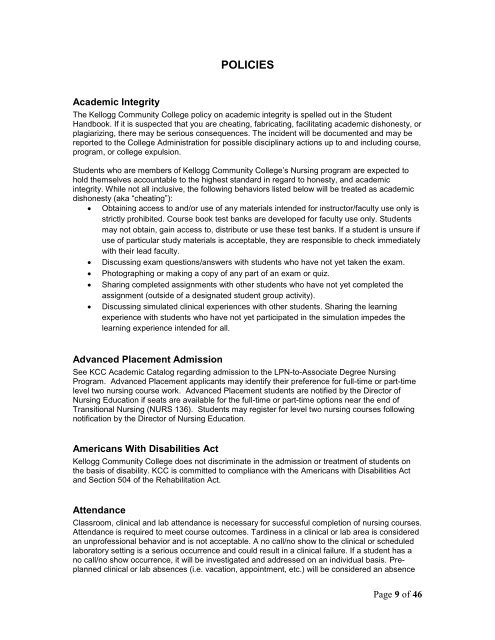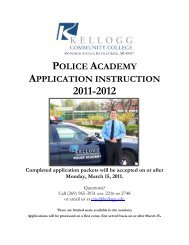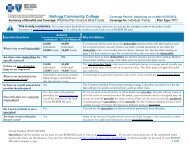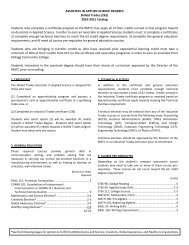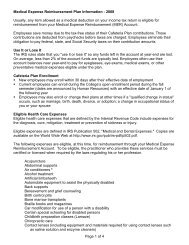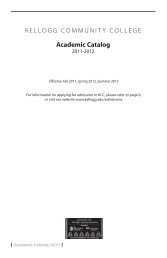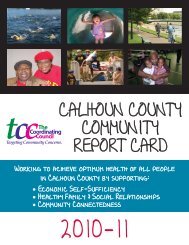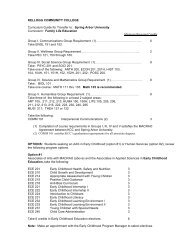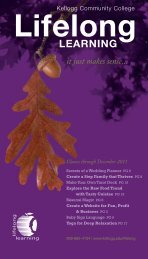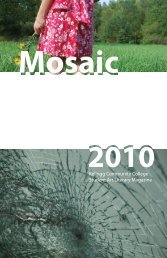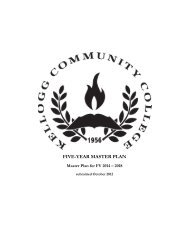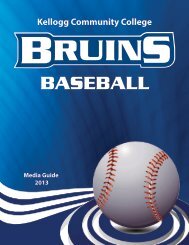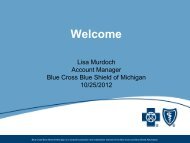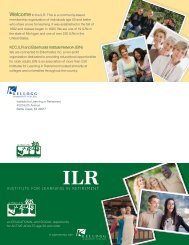Kellogg community college nursing student handbook
Kellogg community college nursing student handbook
Kellogg community college nursing student handbook
Create successful ePaper yourself
Turn your PDF publications into a flip-book with our unique Google optimized e-Paper software.
POLICIES<br />
Academic Integrity<br />
The <strong>Kellogg</strong> Community College policy on academic integrity is spelled out in the Student<br />
Handbook. If it is suspected that you are cheating, fabricating, facilitating academic dishonesty, or<br />
plagiarizing, there may be serious consequences. The incident will be documented and may be<br />
reported to the College Administration for possible disciplinary actions up to and including course,<br />
program, or <strong>college</strong> expulsion.<br />
Students who are members of <strong>Kellogg</strong> Community College’s Nursing program are expected to<br />
hold themselves accountable to the highest standard in regard to honesty, and academic<br />
integrity. While not all inclusive, the following behaviors listed below will be treated as academic<br />
dishonesty (aka “cheating”):<br />
Obtaining access to and/or use of any materials intended for instructor/faculty use only is<br />
strictly prohibited. Course book test banks are developed for faculty use only. Students<br />
may not obtain, gain access to, distribute or use these test banks. If a <strong>student</strong> is unsure if<br />
use of particular study materials is acceptable, they are responsible to check immediately<br />
with their lead faculty.<br />
Discussing exam questions/answers with <strong>student</strong>s who have not yet taken the exam.<br />
Photographing or making a copy of any part of an exam or quiz.<br />
Sharing completed assignments with other <strong>student</strong>s who have not yet completed the<br />
assignment (outside of a designated <strong>student</strong> group activity).<br />
Discussing simulated clinical experiences with other <strong>student</strong>s. Sharing the learning<br />
experience with <strong>student</strong>s who have not yet participated in the simulation impedes the<br />
learning experience intended for all.<br />
Advanced Placement Admission<br />
See KCC Academic Catalog regarding admission to the LPN-to-Associate Degree Nursing<br />
Program. Advanced Placement applicants may identify their preference for full-time or part-time<br />
level two <strong>nursing</strong> course work. Advanced Placement <strong>student</strong>s are notified by the Director of<br />
Nursing Education if seats are available for the full-time or part-time options near the end of<br />
Transitional Nursing (NURS 136). Students may register for level two <strong>nursing</strong> courses following<br />
notification by the Director of Nursing Education.<br />
Americans With Disabilities Act<br />
<strong>Kellogg</strong> Community College does not discriminate in the admission or treatment of <strong>student</strong>s on<br />
the basis of disability. KCC is committed to compliance with the Americans with Disabilities Act<br />
and Section 504 of the Rehabilitation Act.<br />
Attendance<br />
Classroom, clinical and lab attendance is necessary for successful completion of <strong>nursing</strong> courses.<br />
Attendance is required to meet course outcomes. Tardiness in a clinical or lab area is considered<br />
an unprofessional behavior and is not acceptable. A no call/no show to the clinical or scheduled<br />
laboratory setting is a serious occurrence and could result in a clinical failure. If a <strong>student</strong> has a<br />
no call/no show occurrence, it will be investigated and addressed on an individual basis. Preplanned<br />
clinical or lab absences (i.e. vacation, appointment, etc.) will be considered an absence<br />
Page 9 of 46


